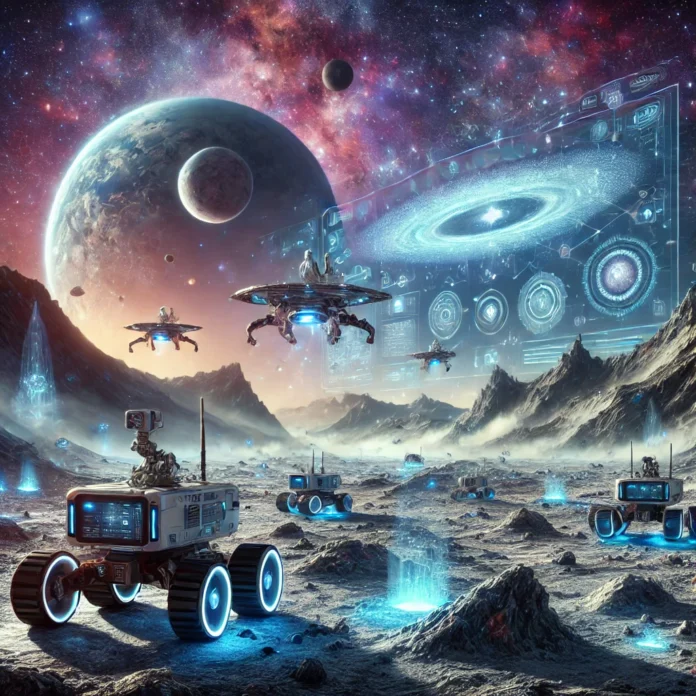Space exploration has always been a testament to human curiosity and ingenuity, pushing the boundaries of what we know about the universe and our place within it. As missions become more complex and venture farther from Earth, Artificial Intelligence (AI) is playing an increasingly critical role in shaping the future of space exploration. From autonomous spacecraft to analyzing vast datasets from distant planets, AI is helping humanity unlock the secrets of the cosmos and prepare for interstellar endeavors.
Autonomous Spacecraft and Rovers
The vast distances and communication delays in space make real-time control of spacecraft and rovers nearly impossible. AI solves this challenge by enabling autonomous operations.
- Mars Rovers: NASA’s rovers, such as Perseverance, rely on AI to navigate the Martian terrain. Using machine learning algorithms, the rover can identify obstacles, select optimal paths, and even prioritize scientific tasks like analyzing rock samples—all without human intervention.
- Spacecraft Navigation: AI-driven systems like those on the European Space Agency’s Rosetta mission help spacecraft autonomously adjust their trajectories, ensuring precise maneuvers to study comets and asteroids.
These autonomous capabilities reduce reliance on Earth-based commands, allowing missions to explore more effectively and efficiently.
Data Analysis and Discovery
Space missions generate enormous amounts of data, much of which requires detailed analysis to uncover meaningful insights. AI is revolutionizing this process by analyzing datasets faster and more accurately than traditional methods.
- Exoplanet Detection: AI algorithms have been instrumental in identifying exoplanets from the data collected by telescopes like Kepler and TESS (Transiting Exoplanet Survey Satellite). By identifying subtle patterns in light curves, AI has discovered planets that might have been overlooked by human analysts.
- Cosmic Phenomena: AI models analyze data from observatories like the James Webb Space Telescope, identifying black holes, supernovae, and other celestial phenomena, advancing our understanding of the universe.
AI and Human Spaceflight
For human missions to the Moon, Mars, and beyond, AI enhances safety and efficiency.
- Health Monitoring: AI systems onboard spacecraft monitor astronauts’ vital signs, predict potential health issues, and suggest preventive measures. This capability is crucial for long-duration missions where immediate medical assistance is unavailable.
- Life Support Systems: AI manages critical life support systems, such as oxygen production and waste recycling, ensuring sustainable living conditions for astronauts.
- Crew Assistance: AI-powered virtual assistants like NASA’s Callisto provide support for astronauts by answering questions, managing schedules, and even troubleshooting technical problems.
Preparing for Future Exploration
AI is also instrumental in simulating and planning future missions. Machine learning models analyze potential landing sites, predict environmental hazards, and optimize resource utilization for habitats on other planets. AI-driven robotics, such as Boston Dynamics’ space-ready robots, are being designed to assist humans in building and maintaining extraterrestrial colonies.
Challenges and Ethical Considerations
While AI offers immense potential, its integration into space exploration comes with challenges. Algorithms can fail or behave unpredictably in unfamiliar environments, posing risks to critical missions. Moreover, ethical questions arise about the role of AI in making decisions that impact human lives and valuable resources.
Conclusion
AI is reshaping the landscape of space exploration, empowering humanity to explore deeper into the cosmos than ever before. By enabling autonomy, accelerating discoveries, and enhancing safety, AI stands as an indispensable partner in our quest to unlock the mysteries of the universe. As we look to the stars, AI is not just a tool—it is a key to realizing humanity’s interstellar ambitions.





